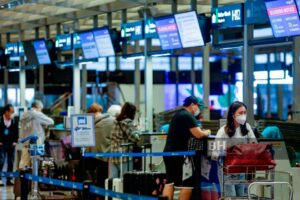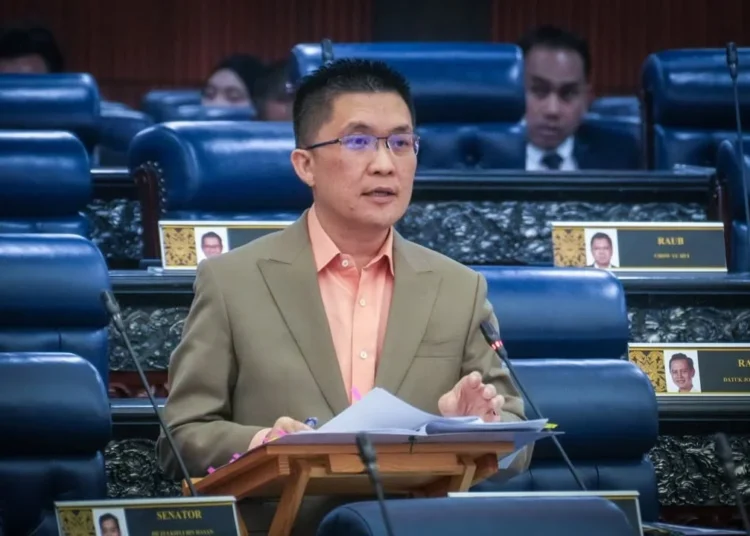The coronavirus has affected almost all countries with more than 50 million people around the world.
There are many different COVID types and variants spreading across the world. Because viruses mutate all the time, this is something that is expected.
But this new variant, called B.1.1.529 or Omicron, has experts particularly worried because it is very different to the original COVID, which current vaccines were designed to fight.
It had a long list of genetic changes with 50 in all. Of these, 32 are in the spike protein of the virus, the part which is the target of vaccines.
On 9th November, this new variant of coronavirus was first detected in South Africa and on 12th November, the World Health Organisation (WHO) has classified this as a variant of concern (VOC).
The main issue with this new variant is we don’t know how it can be transmitted from one person to another and the effectiveness of vaccines is also in doubt.

According to The Star, Dr Koh Kar Chai, the president of the Malaysian Medical Association (MMA) said all Malaysians should be alert to this new variant which has been already detected in Europe and Asia.
Early research revealed that the Omicron variant had a higher chance of reinfection, according to him.
He said experts expressed concern that this variant’s large number of mutations could help it spread or even enable it to evade antibodies from prior infections or vaccination and also called everyone to be alert as all economic sectors have started operating.
Regarding this new variant, Dr Koh wants all Malaysians to strictly follow the SOP even though they are fully vaccinated along with booster shots.
Those who have not yet had their vaccinations are recommended to do so as soon as possible in order to avoid serious severe COVID-19 infections.

Every scientific proof of preventative intervention against COVID-19 should be implemented. No matter what variants it is, the public always needs to be alert and not let its guard down.
Prof Datuk Dr Awang Bulgiba Awang Mahmud, an epidemiologist from Universiti Malaya said our country has to tighten its borders due to the spread of the Omicron variant.
“This is likely the fastest time from variation identification and VOC classification,” he added, referring to the timeframe between 9th November and 24th November, when it was reported to WHO.
Dr Awang Bulgiba, on the other hand, stated that only time would tell whether the new VOC was more dangerous than the previous ones.
“We need to enhance our genomic surveillance and sequencing, along with comprehensive epidemiological research, to ensure we don’t miss any Omicron infections,” he said, adding that the Omicron variation might be readily recognised by a PCR test in cases where there is an S gene dropout.
He stated that by employing the PCR test, samples might be prioritised for genome sequencing.
“It takes time but this is needed for confirmation,” he added.
The vaccine manufacturers are investigating whether their vaccines require updating because of the potential immune escape for the particular VOC, said Dr Awang Bulgiba.

He stated that Novavax has been working on a revised version of its vaccine with Omicron in consideration and that Pfizer, Moderna, and Johnson & Johnson were looking at whether their vaccines needed to be updated.
AstraZeneca alsohad been working for months on a newly updated version of their vaccine (AZD2816) that targeted the Beta variant.
“Because the Omicron variation has some of the same mutations as the Beta form, it would probably not take a long time to update the AZD2816 to use against the Omicron variant, if indeed there is a need,” he added.
In order to protect the country from the potential spread of the variation, Dr Awang Bulgiba urged that vaccination for kids, as well as the booster programme, be finished as soon as possible in order to attain maximal protection in the population.
Assoc Prof Dr Malina Osman of Universiti Putra Malaysia said early data suggested that the new variant’s protein differed considerably from that utilised to create vaccines against Covid-19 infection.
She stated that the Health Ministry’s present procedures were enough, but that the public must continue to follow the SOP.
“The travel prohibition for the affected nations should be maintained until the particular clinical impact is identified,” Dr Malina stated.

Following the appearance of the new variant, the ministry said on Friday that Malaysians would be barred from travelling to seven African nations.
Foreigners who have visited South Africa, Botswana, Eswatini, Lesotho, Mozambique, Namibia, or Zimbabwe in the previous 14 days will be quarantined entry into Malaysia.
Follow us on Instagram, Facebook or Telegram for more updates and breaking news.








